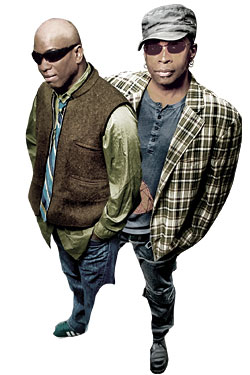
I haven’t been in this studio since my second-grade class took the NBC tour years ago,” blurts 51-year-old Living Colour guitarist and founder Vernon Reid. Onstage at Late Night With Jimmy Fallon after a rehearsal, the group—best known for its soaring, catchy 1988 megahit “Cult of Personality” and a now long ago habit of wearing bright spandex—is back, still endeavoring to mix commercial pop and agitprop. Their new album, The Chair in the Doorway, features the single they just thrashed through, called “Behind the Sun.” It’s about Katrina. “Originally, Vernon and I started writing ‘Behind the Sun’ with ‘The World Is a Ghetto’ kind of theme,” singer Corey Glover, 44, says, referencing the classic War song about universal poverty. “But after my wife and I went to New Orleans earlier this year and witnessed firsthand how devastated that part of the country still is four years later, I felt compelled to change the lyrics.”
The new single was well received, but Fallon’s production crew and stagehands really came alive to the band’s rendition of “Cult of Personality.” Released the same year as landmark New York City soundtracks It Takes a Nation of Millions to Hold Us Back (Public Enemy) and Daydream Nation (Sonic Youth), the song was in constant rotation on MTV, and made them stars. As it reaches its chaotic climax in the studio, everybody in the room begins excitedly clapping and cheering. The band smiles shyly, as though amazed by the crowd’s reaction to a song they’ve played for more than twenty years.
Reid and Glover met at a birthday party in Brooklyn in 1986. Glover was born and raised in Brooklyn and today lives in Harlem with his wife, a schoolteacher, and two sons. Reid was born in London to a Caribbean family and immigrated to Brooklyn when he was 2. He was given the Jimi Hendrix album Band of Gypsys while a student at Brooklyn Tech High School; he was also a Santana nut after first hearing “Black Magic Woman” on WNEW. These days, he lives on Staten Island with his dancer wife and 6-year-old daughter.
“We got in late last night from our gig in Dallas, and then I had to wake up early this morning and take my boys to school. I came straight to the studio from there,” Glover says backstage, before kicking off his green Pro-Keds for a nap. Reid comes in with a $20 bill someone gave him right out of an ATM. On the back, someone has written obama is a nazi along the borders. “Can you believe this?” he asks, feigning shock.
While rock-history books overflow with references to groups like Television, Talking Heads, Blondie, and the Ramones, little has been documented about pioneering black rock bands PBR Streetgang, 24-7 Spyz, Eye & I, Faith, and J.J. Jumpers, who performed at the same Lower East Side venues. But at the time, there was a scene, spearheaded by a nonprofit called the Black Rock Coalition, which Reid helped to start in 1985. “The price of real estate makes it impossible to repeat,” laments Reid, who spoke at CBGB owner Hilly Kristal’s memorial in 2007. “Nobody can afford just to open some little hole in the wall where bands can develop.”
Fiddling with a bottle of water, Reid twists off the cap and takes a sip. “Success is disruptive in ways that some people don’t understand,” he explains. “In the beginning, Living Colour was a local band fighting to get noticed, struggling to get a following, and battling record labels to take us seriously. But once all of that happened, we still weren’t prepared.” Living Colour split up in 1995 and reformed to tour again in 2001. “Before Living Colour broke up, there was a lot of pressure on us,” Reid says. “My first marriage was breaking up; Living Colour was touring, but communication within the band was spotty. The problem with men is, we don’t have a language for emotion. We’ll curse at each other but never really talk.”
Forty minutes after he drops off, Glover stirs awake. Stretching, he knocks over my cup of coffee. “Sorry about that, man,” he says.
“These days, Living Colour is on a family vibe, with Vernon as the big brother,” Glover says, laughing. “It used to be that Vernon and I were constantly fighting for attention. But we complement each other. Vernon is never going to be able to sing like me, and I’m never going to play guitar like him. After all this time, we finally realize how important it is just to be around one another.”
Have good intel? Send tips to [email protected].